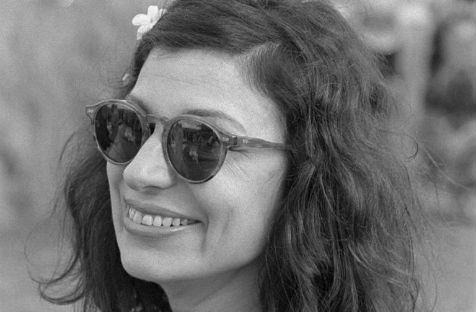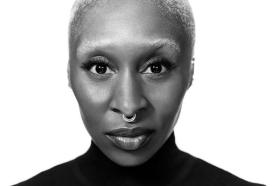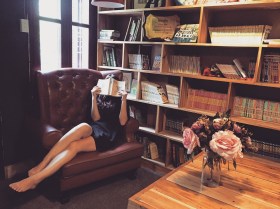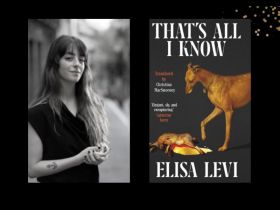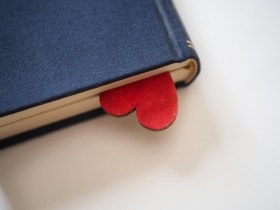Amber McCulloch’s career in the arts began at 17, when she designed costumes for theatre and performed in cabaret troupe, the Fabulous Vo-Vos. She then completed a Bachelor of Art Theory at UNSW College of Fine Arts and manned the counter at Oxford Art Supplies in Sydney.
Freelance writing opened the door to a decade the publishing industry, whereupon she worked as a sub-editor and editor on titles such as NW, Optus, Disney Adventures and Art World.
Amber has worked as Communications & Projects Manager at the British Council since 2010 and was until recently, Managing Editor of Runway magazine.
What did you want to be when you grew up?
A musical-theatre performer! And a visual artist. Possibly with a side-line in advertising (it was the 1980s, after all).
When did you know you would work in the arts?
Pretty much always, although I thought I’d end up a practitioner. Growing up, I had no real idea that there were ‘legitimate jobs’ in the arts – high school art teaching was as far as I thought it went. Then I started designing costumes for theatre when I was about 17 – that really opened my eyes to the breadth of ‘support’ roles out there.
How would you describe your work to a complete stranger?
I handle all of the marketing, PR and communications for the British Council in Australia. I also manage some of our arts projects, including (up to now) Realise Your Dream.
Is there a mission to your work?
Yeah – I want everyone to be familiar with the amazing work the British Council does in Australia! We support so much Australian talent, and introduce Australians to really amazing stuff from the UK. It’s a good thing to be part of.
What’s the first thing career related you usually do each day?
Wake up! I’ve normally got a bunch of things spinning in my head over breakfast. The boring answer, though, would be to check in on all the emails that have come from around the world (Britain, especially) overnight.
Can you describe an “average” working day for you?
Wow, it’s different every day. We’re a really tight little operation in Australia, so we kind of juggle things between us. Some days, I’ll be building a website, working with a creative agency on the campaign for one of our programmes or writing press releases and stories for publication. On other days, I could be organising an event, judging Realise Your Dream or meeting with our corporate partners.
What’s the one thing – piece of equipment, toy, security blanket, – you can’t work without?
Haha. LITERALLY my blanket. Our office air-con is out-of-control freezing.
What gets you fired up?
Working on a really fun creative campaign, like the ones Boccalatte have done these past two years for Realise Your Dream. It’s awesome to brief them on the job by saying, “You know the programme – go for it!”, then to return a month later to see what they’ve come up with.
Who in the industry most inspires you?
Deirdre Brennan, who is General Manager / Director of Channels & Branded Services Australasia at BBC Worldwide Channels. We’ve worked in partnership with the BBC these past few years, and Deirdre kindly sat on the judging panel for Realise Your Dream last year. She’s an incredibly energetic, diverse and stylish lady, who is deeply embedded in the media.
What in the industry do you despair about?
Publishing, hands down. As an ex-magazine editor, I’ve just watched the industry get pulled apart in recent years, starting with the sub-editors and writers. While I love digital media, I worry that the respect for the craft of writing and publishing has suffered at its hands.
What is the best thing about your job?
Getting to work on projects that I am actually interested in. So many of our projects are things that I would want to see/be part of even if I didn’t work here.
What’s the worst?
Our internet connection – it’s routed halfway around the world and can make the ‘digital comms’ bit of my job a living nightmare.
What are the top three skills you need in this industry?
Flexibility; organisation; imagination.
What advice would you give anyone looking to break into the field? .
Use your creative skills to complement your practical ones. Don’t be afraid to voice your ideas – they might be good ones. Also, learn everything you can from every job you do.
How do you know when you missed the mark?
I guess it’s very tangible for me – audience numbers, application numbers and press numbers. That said, I personally learn from every campaign I run or comms material I put out – I think it’s important to critique your own work honestly, so you can do a better job next time.
When do you know you’ve made it?
As above, reversed.
For more information about GREAT Britain Arts 2013 visit greatarts13.org.au or check out our dedicated Festival Focus.
